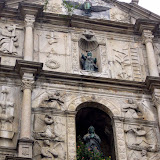Saturday, April 5, 2008
by Eva.Usermaatre
By the end of World War Two, Germany has already become a ruin, not only those physical cities, but also in the mental world of German people. They faced a total destruction: broken cities, shortage of food and labor, homeless people, disarmed industry facilities and especially the haunted past. Confronted with those hard situations, 1945 marked as a new beginning for the Germans-Stunde Null. Everything in the past has been destroyed, then a new one can be built. The old Germany has gone and a new one was about to rise. City after city, people slowly and painstakingly rebuilt their homes. In order to control the inflation, government introduced the currency reform which can be seen as the turning point of German economy. And politically under the strong leadership of Adenaur, Germany re-established democracy, and went out the shadow of political crisis after 1945. Even though, the way Adenaur achieved the goal was somewhat authoritarian, but it was greatly because of Adenaur, Germany could stand equally with her western European countries. Although the Stunde Null labeled as a new beginning, but the past did not disappear, instead it kept haunting the Generation45. Faced the feeling of guilty it would not be easy to just say: ich bin nicht Schuld. The guilt past continually emerged before the Generation that they were unable to confront with it. And the Nurnberg Trail seemingly gave Germans a chance to say: it was them not me that committed those crimes. And the ordinary Germans chose to focus one more practical problem rather to confront with the unbearable past.
1950s Germany experienced the economic miracle. The fast growth of economic power and material goods, allowed Germans to improve their living standards. And the secret behind this miracle was the invention of the Social Market Economy which took the middle road of socialism and capitalism and was aimed to balance the distribution of wealth, increase social welfares and control inflations. The system of collective bargaining and codetermination allowed sides, company and workers, to gain their profits. With the economic miracle taking place, a cultural change also followed. Everyday life and living pattern were greatly influenced by the miracle. A new consume culture was developed. Household was equipped with new electronic devices, wagen become the newly favorite item of people, and fashion motto was: shop until you drop and eat until you drop. For the problem of past, people enjoyed Heimat Film, which created an ideal past, more than confronting with the true past. Also people were keen of making vacations, going out to enjoy different views. At the same time, with the Marshal Plan which was more mentally influential than economical influential, the American cultures poured into Germany. Coco-cola, Micky Mouse, Rock n’Roll, Hollywood…A period of Americanization began which filled in the German cultural blank and also marked a total contrast with the old generation. Young people quickly absorbed those elements and developed their own behavior and worldviews. They tended to be more rebellious and more critical about the old generation. So far, West Germany had changed a lot, they have already get rid of the economic crisis and started a new economic bloom. But beneath the martial world, this generation still could not get rid of the past, they kept silence, but the past was always there. So as the new Generation was in formation, they disagreed with their parental Generation45.
On the other side of wall was East Germany. She was under the total control of communism, and differed very much from West Germany with many aspects, from political, economic to everyday life and culture. Contrasted with its appealing political goals, the reality was totally different with SED’s political claims. The entire society was control by a single political party SED, from economy to single person’s daily life. The Eastern government abolished the free market economy and put the entire economy under the name of nation. There was no private ownership and the goods needed to be distributed. As to people’s life, they always face with food shortage and their private lives were controlled by state and its policeman. People were taught by the party that they have to follow whatever the party said and the party was always right. Life in East Germany was repressive and hard, eventually people rebelled and the society became very unstable.
The Generation45 was formed after the World War Two and faced with a broken past and the urgent desire of a new beginning. And with the division of Germany, East and West went on two different ways, and their people too. Western people with democracy and social market economy experienced great cultural change and gained more material life, but the past kept haunting Western people. In East Germany, with the claim of total break with the past, people were under communism control, and lived a repressive life.









